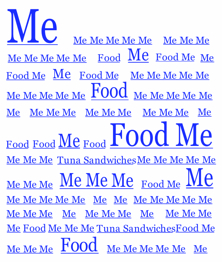I’ve been thinking a lot about the terms “vain” and “selfish” over the last bunch of years. And Tom Allen wrote a blog post which brought a lot of that stuff back to the forefront of my mind, and also helped me clarify some of my thinking on it. There was a theme in his post which reminded me very much of this previous post, which he published almost exactly 13 months to the day before this more recent one.
- (I wonder if Tom’s posts about his vanity have anything to do with the time of year. Could all that revealing summer clothing be a contributing element?)
I’ve been thinking about his post a lot since I first read it. I started this post almost immediately, but then I put it down, picked it up again, left it, resumed, paused, started, stopped and restarted loads of times since the end of July. Anyhow, exploring my thoughts on the terms “vain” and “selfish”, and self validation, and my personal rules I try to live by, and reading what Tom had to say, was what spawned this post.
Tom’s Posts And My Comment
So in that previous post I mentioned, Tom wrote
- “Women don’t make passes… … at men who wear glasses.
For cryin’ out loud in a bucket – could I possibly be acting more vain?
[…] I realized that just sitting at my desk staring at a blueprint the numbers were fuzzy – but it wasn’t because of the fax machine, it was because of my eyes. Sitting, they looked fuzzy, but when I stood up they were sharp.
So I steeled my reserve, and made the call to the eye doctor.
[…] I suddenly realized what “look” that I was hoping for: You know the stereotype of the staid, conservative librarian, who takes off her glasses as she lets down her hair and becomes sexually alluring? I was trying for the manly version of that. Assuming that there is such a thing.
Yeah, like I said at the beginning: vain.
[…] I walked out of the store, turning my head from side to side to get accustomed.
Then I spotted the mirror.
I tried to be nonchalant, but I’m sure they noticed me checking myself out. I just hope I didn’t come off as too conceited. It’s unbecoming for we librarian types, you know.”
After reading that post, I’d noted
- “I think the face is one of the primary visual elements of our identity. I don’t think it’s strange that when there is any alteration to the face, or modification to it, that a person would spend a lot of time in front of the mirror re-identifying themselves with the difference.”
And 13 months later, Tom wrote this:
- My pants are getting less snug, I’m seeing more definition in my arms and shoulders, and the other day I even noticed (finally!) some muscle definition around my abs. […] So one morning I’m admiring myself in the mirror, […] when [Mrs Edge] gave an exasperated grunt.
“You’re so vain,” she told me.
[…] See, here’s the thing. Guys […] don’t really think about how they look. […] we’re simply not used to thinking about ourselves in that fashion. And I actually do feel a little silly looking at my body and trying to spot the small changes that happen over the weeks.
[…] Vain? Personally, I realized that I hadn’t thought much about my own body in 20 years. […] too late many of us realize how much easier it is in the long run to maintain what we have than it is to try to repair the damage.
[…] Vain? While I’m ashamed to have let myself go as far as I did, […] I’m starting to look better, […] feel better about myself, which encourages me to keep at it. And Mrs. Edge has noticed the difference, too; I think that she’s just tired of listening to me turn my body into a project, obsessing over the little details.”
After reading all that, I thought, if the face features at the top of the list of elements representing and communicating our personal identity, I think the body must weigh in at number two.
My Subsequent Post Spawnage
I wouldn’t be surprised if part of what’s going on in front of that mirror is Tom re-identifying himself with his changing body. I mean, when the person stays the same but the body changes, it seems natural enough to me that a person would want to assert not only that their changed body really does house the same human being as before, but also that the changed body really does belong to them, and fits them well as a person.
I go on about some of my own experiences of this later on in a bit of a tangent.
- Tangent, moi? Who knew?
Anyhow. :p
I totally validate Tom’s entitlement to celebrate all the hard, tedious slogging he’s been putting in (well done Tom!!). And I totally validate Tom’s entitlement to celebrate and enjoy his hard-earned and hard-won health and hotness benefits (drool). So Tom’s expressed discomfort with all that (i.e. feeling silly looking in the mirror) bothers me somewhat. Additionally, I feel uncomfortable with Mrs Edge’s (in my opinion, erroneous) assumption that visual self-interest equals vanity, and with Tom apparently buying into that (“obsessing over the little details”) even when he also isn’t buying into that (“ashamed to have let myself go as far as I did”).
I think that too often, appropriate and healthy self interest is denigrated, dismissed, and invalidated by writing it off by name calling with terms such as “vanity” or “selfishness”.
- This post was going to be a comment over on Tom’s post but it got too long.
Enh, who knew. :p
The Expoundathon
There are two words which I hear thrown around a lot, rather carelessly in my opinion, which I feel do a lot of harm.
One is “selfish”, and the other is “vain”.
(I appreciate that the term “selfish” was not used in Tom’s post, but it’s a related issue for me, so I’m including it)
This is what Apple’s Dictionary.app has to say about them:
- self●ish |ˈselfi sh |
adjective
(of a person, action, or motive) lacking consideration for others; concerned chiefly with one’s own personal profit or pleasure - vain |vān|
adjective
having or showing an excessively high opinion of one’s appearance, abilities, or worth
Apple Dictionary.app, Version 2.0.2 (51.4)
© Copyright 2005-2007 Apple Inc., All rights reserved.
Now, to be honest, I have a bucketload of issues about “selfish” and “vain”, and more of them are about “selfish” than they are about “vain”. But since they both seem to push similar buttons with me, I thought I’d use Tom’s posts as a springboard and use them to leap into my usual expoundathon.
- (sorry Tom) :p
My Problems With Terms
I think that Tom’s intellect is competing with his psyche. From what I read, I think that Tom clearly recognises that he had unacceptably been neglecting himself, and is not now being vain at all. But his psyche seems to feel that no matter how much he neglects himself, he will always be guilty of vanity, just because he will never be able to lose his inherent interest in himself.
- Just for the record, I think that maintaining a large dollop of self interest is a good thing.
I mean, how is exhibiting an appropriate and healthy interest in one’s own changing body “having or showing an excessively high opinion of one’s appearance, abilities, or worth”, as the definition of “vain” describes?
Looking at those definitions, and regarding the term “selfish” – I think we are all chiefly and primarily concerned with our own profit and pleasure. And yet not all of us are considered “selfish”. I disagree that self concern by definition requires a lack of consideration for others, or that a primary concern with the self excludes the ability to exhibit or feel appropriate and mutually beneficial consideration for others. So that definition bugs me. If I had to make my own definition, I’d probably describe it something like – “Self absorption to the exclusion of nearly everything else“. But that’s not how “selfish” is officially defined, which is part of why that term bugs me.
And regarding the term “vain” – who decides precisely when a high self opinion becomes “excessive”? Excessive for whom? In excess of what? If it were up to me, I’d probably define it something along the lines of – “Self absorption, particularly in one’s own visual appearance, to the exclusion of nearly everything else“.
Are we seeing a pattern here?
The point I’m trying to work my way gracefully towards (more or less successfully, depending), is that I get a much stronger feeling from the people who use those terms than I get from the people who are tagged with those terms by others. In other words, the people who choose to use those terms make a stronger impression on me than the people they are intending to describe. I consider the terms “selfish” and “vain” to be unpleasantly emotive terms which aren’t usually helpful – except perhaps to help identify the users of those terms as possible narcissists.
Well, I don’t suppose that was put as clearly as I’d like, but maybe you got the picture anyhow? If not, oh well. Maybe it will all become clearer later on.
I live in hope. :)
Lesson Badness
I think there is so much fear centred around appearing “selfish” or “vain” to others, that many people try to go too far the other way and disregard themselves much more than is healthy. I’ve spent some time considering what’s up with that (when I probably should’ve been out enjoying myself, but never mind). Here’s some of my conclusionosity.
- Most of us are raised with repeated and reinforced lessons that
- prioritising ourselves is undesirable
- prioritising others over ourselves is desirable.
- This lesson is often reinforced by also teaching us to expect that
- we must prioritise everybody else over ourselves
- we must discard any kind of self-interest
- to do otherwise would be “selfish” and “vain”
- to do otherwise would make us “selfish and “vain”
- to do otherwise would therefore make us undesirable as people.
- This lesson is often re-reinforced by also teaching us
- to expect others to prioritise themselves over us
- to expect and permit others to have the self interest which we are denied
- to expect otherwise would be “selfish and “vain”
- to expect otherwise would make us “selfish and “vain”
- to expect otherwise would therefore make us undesirable
- to expect otherwise would likely lead to us being name called and rejected.
- So we’re brought up learning unequivocally that
- we must prioritise everybody else
- we will not be prioritised by anybody else
- The bottom line of these lessons is that
- we must regard and treat everybody else as more important than we are
- we must expect to be regarded and treated as less important than everybody else
- we will be name called and rejected if we do otherwise
- any other expectations will attract the name calling epithets “selfish” and “vain” (and likely many others)
- any other expectations will risk our rejection by others.
- I think these lessons suck sweaty, hairy, smelly, donkey balls.
- I think “selfish” and “vain” are denigrating terms for what might more usefully be called “appropriate and healthy self-interest”.
This can lead to the possibility of rejection, and therefore introduces a strong fear association between exhibiting appropriate self-interest, and being punished with name calling and rejection.
and knowing that if we appropriately and healthily self-prioritise or exhibit any desire to be prioritised by others, then we (realistically) fear name calling and rejection because this has likely happened to us before.
As a reality check, I’d like to point out that anybody who
- expects or demands to be prioritised by another person at that person’s expense
- expects another person to sacrifice any portion of their emotional or physical well being to benefit them
- name calls and/or rejects a person for not prioritising others at their own expense, using epithets such as “selfish” or “vain”, and/or by withholding affection
is far more likely to realistically fit the definitions of those terms themselves than the people they accuse of such behaviour.
Just have a think about that for a moment.
The Ten (Unwritten) Commandments
So, essentially, most of the human race appears to be unequivocally and quite firmly taught these unwritten commandments which are seldom explicitly discussed, but frequently overtly enforced. Having made some observations, I have noted down these commandments.
So now, for the first time ever – The Ten (Unwritten) Commandments!
(drumroll please…)
- Thou shalt not prioritise thyself.
- Thou shalt despise thine own prioritising self-interest, and thou shalt despise thy neighbour’s attempts to prioritise thee.
- Thou shalt know that ye be not prioritise-worthy, so thou mayest well waketh up and smelleth the coffee already.
- Thou shalt not even desire to prioritise thyself, for thou shalt be considered selfish and vain, and be name called and rejected, verily.
- Thou shalt sit in judgment of others who self-prioritise, and point thy finger, and waggle it, and thou shalt expect and accept being sat in others’ judgment against thee; and forsooth, competition for ugliness of judgment shall be fierce, and finger waggling shall beget itself eleventyfold, and all manner of vessels shall runneth over with evil finger waggling in abundance.
- Prioritising thyself shall be punished; and lo, thou shalt suffer rejection, name calling, terror, nausea, the burning ague, guilt, the pox, sorrow of heart, and more guilt; and ye shall not rent thy garment even though thou wantest to when thy neighbour eatest all thy cornflakes, because thou shalt not complain about such trespasses, not even grumble a little bit.
- Thou shalt thyself name call and reject all who prioritise themselves, and thou shalt expect, accept, and participate in thine own name calling and self-rejection shouldst thou prioritise thyself; yea, even though thine own and others’ efforts to self-prioritise be worthy and healthful (and in trespass against Commandment 1), thou shalt uphold this Commandment.
- Thou shalt prioritise thy neighbour above thyself, and thou shalt thusly expect and accept thy neighbour’s expectations and demands for thy prioritisation.
- Thou shalt be overcome with guilt for every trespass thou makest against Commandment 1; even as thy neighbour shall prioritise themselves and expect thee to prioritise them too, as long as thou dost not self-prioritise, the rest is quite besides the point and is none of thy business. See Commandment 1.
- Thou shalt not resent nor question the double standard. So there (sayeth the Bored).
I say boo sucks to that.
Since one of my prime directives for myself is to respect my own and others’ right, privilege, responsibility and obligation to prioritise ourselves first, over everybody and everything else, without question or exception, I do tend to notice when people behave in ways which contravene this directive. And the contraventions I have observed seem so consistent to me in their nature, that I feel that the commandments I’ve listed are general enough to fit most people, most of the time.
I don’t like them, but still, they do seem to fit.
But now, a bit of a tangent. Don’t worry, I will ultimately get back on topic, promise. :)
My Adolescent Growth Spurt
Growth Spurt – The Physical Part
I vividly remember my one and only growth spurt during adolescence. Between the ages of approximately 9 – 16, I didn’t grow taller. I mean, my body literally took up the same amount of room for the duration of those years. My feet grew, but the rest of me did not. I was a child who was wearing out her clothes and getting new ones in the same size. I remained 4 feet 11 inches tall for about 7 years.
When I did finally shoot up, I grew 7 inches in 8 months. I grew so fast that when I looked down at my own feet, they looked so unfamiliarly far away that I got dizzy. I was eating 3 portions of food at every meal for most of those 8 months. At the end of it, I looked more or less as I do now. I felt like I’d gone from looking like a fairly shapeless chip-like object to Wonder Woman, in the time it takes to sneeze.

I remember the awkwardness of learning to manipulate my new limbs, having to re-learn my body awareness, changing my perception of how much room I took up relative to the space around me. I bashed into things a lot. I remember the bizarre feeling of running down the stairs and having bits of me wobble in new places, when a few weeks before there’d been nothing wobbling anywhere. Having bits of me all of a sudden move independently from other bits outside my control felt really freaky, and took a long time to get used to.
Some of those bits really hurt, too. Developing bosoms are fucking sore, I can tell you. At the time, I wondered how the hell anybody managed to live with these unwieldy appendages inconveniently and painfully sprouting all over the place. I still have the stretch marks.
Growth Spurt – Weird Changeness In Others
Meanwhile, back at the ranch – all of a sudden guys at school who’d been extraordinarily shitty to me the year before, instantaneously changed tack and were either being suspiciously nice to me, or were intrusively focusing their attention on my new wobbly bits.
Around that same time, I noted and remembered that line from Shaw’s Pygmalion, because I identified with what it said so strongly, and which to this day remains one of my all time favourite lines ever:
- “the difference between a lady and a flower girl is not how she
behaves, but how she is treated.”
(emphasis added by me)
And I noted at the time that the difference in practice between a person who is considered attractive, and a person who is considered unattractive, is not so much about their actual appearance, but about peoples’ opinions of that appearance, and their behaviours resulting from those opinions.
I changed very fast, whilst remaining in the same environment surrounded by the same people, so I was in an excellent position to notice the radical and comprehensive change in people’s behaviour towards me, which turned out to be in response to their visual perception of me and nothing else.
Now, I knew perfectly well that I was exactly and precisely the same human being I’d been 8 months earlier. Yet here everybody was, behaving exactly and precisely as if I were a completely different, new, and somehow more fascinating individual.
I was in a boarding school in the middle of nowhere at the time, in an enclosed environment without much access to the outside world, so think I got an exceptionally clear picture of how a specific group of people behaved towards me when I looked one way, and how those very same people radically and comprehensively changed their behaviour towards me when I looked a different way.
- For the guys it was way too late, of course. They had already revealed themselves and their motives to me the year before, so I already knew what they were like before they suddenly found that I now had something they wanted. I can tell you that just because they now decided to pretend that they were human beings, this was never going to erase my knowledge of their previous behaviour.
The only body fluid they had a chance in hell of getting out of me, was snot. Nevertheless, I was more than willing to share of that freely. :)
But the thing was, I didn’t only notice this radical change in the males. I noticed it from pretty much everybody – students, faculty, staff, employees, and visitors. Everybody, without exception, was responding to me significantly differently than they used to, even the people who liked me before, and even the people who knew me well.
Growth Spurt – The Yoghurt Wars
What I used to get from most people was an initial response of indifference, followed by either interest or dislike. What I always hated was that I really had to work for people’s initial attentiveness in conversation. I felt I was entitled to people’s attention when I spoke, instead of having to fight for it every single time. I saw that people who were regarded as attractive got that attentiveness straight away, whether they merited it or not. I felt I had interesting and pertinent things to say, but I nearly always had to fight to be heard.
- It felt quite galling to me that I had to fight to divert people’s attention from those who were visually more attractive than I was, and yet those same attractive people could have been intellectually outmanoeuvred by a yoghurt.
Grrr.
Often when I said something which people found interesting, they exhibited a rather unflattering surprise, as if their inability to feel interest in my appearance must somehow represent my inability to be interesting.
That tended to largely piss me off.
I think this is the reason why I’m a whole lot less interested in a person’s looks than most people I know. I know that how a person looks for the most part isn’t something they choose, isn’t something they earn, and isn’t something they can entirely control. I feel that a human being’s behaviour has a whole lot more to do with who they are than their physical appearance, and that is how I learnt to assess people.
Growth Spurt – Pretty People
I even find (perhaps perversely) that I instinctively prefer to avoid those whom I regard as “pretty people”. This may be because my experience has led me to conclude that “pretty people” often rely and base their own merit and credibility primarily or exclusively on their appearance, usually at the expense of their brain (if any), and at the expense of their efforts in other areas which are usually more interesting to me.
- (kvetch is an exception to this because, although he inhabits a body which I enjoy for its exceptionally pleasing shape, topped off by a handsome face with symmetrical features, the fact that he does not FEEL attractive despite objective evidence to the contrary, means that however good he looks, he does not rely on his appearance in the way which “pretty people” often do. Also, he has a functional brain and skills in areas other than his appearance)
Over time I came to adjust, and no longer expected the response from people I used to get, and became accustomed to the responses I was now consistently getting.
But I always remembered the way people responded to me before.
Ok, Tangent Over – Back On Topic
- design © Rachel Plefger
Two major things which relate to Tom’s post (don’t worry, I do usually get there eventually), were that
- However I look now, I still sometimes feel like a fairly shapeless chip-like object
- However I feel now, I am no longer being responded to as if I looked like a fairly shapeless chip-like object
To this day I still feel strongly that the positive responses and attentiveness I now enjoy are a gift which could be taken away at any time. I still find it difficult to assume that a person’s attentiveness represents their interest in me personally, instead of a simple (and all too commonplace) interest in my appearance. And although I appreciate that I never did anything to earn this gift (unless you count surviving adolescence), , it was something I had always wanted and felt I (and indeed everybody) had always merited.
But I mostly didn’t get it til after that growth spurt.
A lot of the time I still feel like that fairly shapeless chip-like object, and can only credit people’s attentiveness if it persists over time. Because I know that the second I appear to others like that fairly shapeless chip-like object, their attitudes will change back to what they were before. I’ve seen those attitudes even now, from people who are interacting with those whom they don’t regard as attractive.
- So I do not in any way regard personal appearance as a trivial thing.
I think it takes a long time for a person to become comfortable with and learn to inhabit their body as part of their identity as a human being. And some people never ever manage it. People respond to other people’s bodies as personal identity markers. My identity has had to grow into its new body, and I have had to learn to feel comfortable with appearing attractive to others. (which I still don’t, oftentimes) On some days, my self and my body still don’t feel as though they have grown together, even though over 26 years have passed since then.
If we always appeared as we felt, then I’d still look like that fairly shapeless chip-like object a significant proportion of the time.
When I remember how long it took me to grow accustomed to my new body, I’m not surprised that Tom does regular mirror checks to reaffirm his association between his changed body, and himself as the unchanged human being housed within it.
Besides, an interest in mirrors is a sign of self-awareness. Dolphins are fascinated by mirrors, and primates are too. Are they vain? Is any particle of self-interest, no matter how small, vain by definition?
In Short
I don’t agree that looking in the mirror with an interest in one’s own appearance is by definition vain. I often look in the mirror and try to remind myself that I really do look like the person in my reflection. And furthermore, I feel strongly that characterising such behaviour as “vain” is damaging, denigrating, inaccurate, and entirely unproductive. I mean, what’s the point of denigrating such self interest? Who else suffers from an exponent of such behaviour? How does it hurt anybody? Who loses by it? What can be possibly gained by denigrating such behaviour?
I think that attention, care, and interest in one’s own personal appearance is entirely healthy, appropriate, and necessary. I think that we are wrongly encouraged to have no self interest at all, mostly by those who want us to focus entirely on others who are comprised of nothing but self interest. And we learn those lessons so well, that most of us unthinkingly parrot them back forever, never questioning them, and never managing to unlearn them.
- I think that using name calling (including use of the terms “vain” and “selfish”) to dismiss, minimise, and invalidate any person’s necessary, healthy, and appropriate interest in themselves (including their appearance, and even if solely used by a person to self-denigrate) is at best disrespectful, at worst harmful, and in my opinion, entirely pointless.
And I guess that was what I wanted to say.
Thank you for reading. :)

























From the all too few bits and pieces I’ve seen, you’re quite the hottie, yourself.
And since I just happened to have come from the hospital for more stoopid tests, I think that I’m motivated to respond to this – but it’s gonna take a while. I’m busy all week, what with my manicure and massage appointments, workout sessions, and fittings for my spandex bicycle shorts.
Gosh, Tom, I hope you out-stoopided the stoopid tests, and whupped their arses real good.
And what I wouldn’t give to be an innocent bystander caught in the crossfire of your spandex shorts fittings. :p
The Grey Geezer haz shortz! :)
The damn technicians will never come out and say “Oh, your arteries look good, Mr. Allen,” or even “Have you made out your will, yet?” It’s always “You’ll have to discuss the results with your doctor.”
PITA.
Fortunately, the tech caved in to my sexxay charms*, and intimated that things looked pretty normal to her.
*which was mainly batting my eyelashes and showing off my manly chest – which was already unbuttoned. The shirt, that is.
But just for you, I’ll make sure that I get a shot of my in those shorts. It’s the least I can do after all the drooling I’ve done over your corsets.
Ok, mutual droolage just sounds so delightfully filthy. :D
(I’ll just have to take care that I don’t swamp myself in my own drool whilst awaiting your undoubtedly drooltastic pictures)
ps: Thank you so much for the Grey Geezer Health Update and Test Result Connivingness Report. :)
Additionally, I feel uncomfortable with Mrs Edge’s (in my opinion, erroneous) assumption that visual self-interest equals vanity
So, this morning I step out of the shower and begin making those he-man muscley poses, and I said “Pretty soon you’re not going to know what to do with me. I’ll be so skinny that you won’t have anything to grab on to.”
To which she replied “Is it because you’re going to be so full of yourself that you’re going to float away?”
:sighs:
Oh wow, harsh. :/
Does she make these kind of remarks often?
I’m supposing you know better than to try a similar one on her to illustrate its effects…
I just want you to know that I for one seriously appreciate your bum, whatever size it is, and I’d grab you even if you had fleas and were round enough to fill a large rotunda. :)
There.
I think that she’s jealous. Or something. She’s been on a weight loss thing for a few years now, but gets sidetracked. Or sidelined. Or something. She’ll lose 5 pounds, then slowly gain it again. I’m going to have to ask her (when we get a moment without kids and visitors around) if there’s an issue that she’s not telling me about.
And yes, I rarely provide the “making a point by example” example. Rarely. Hardly ever.
Except for the other day, when she went on about the really nice house she visited (for the umpteenth time), but then sighed and said that she guessed that she’d be happy in our little place, since we’ll never afford one of those suburban McMansions.
That’s when I went on about how hawt Angelina Jolie was, but that I’d try to settle for what I’d got, since I wasn’t going to be married to AJ.
The doctors said the cast should come off next week.
Yeah, asking her if there’s something bothering her sounds like a productive path to take.
If kvetch makes a remark like that, I know something’s the matter, because he normally doesn’t make those kinds of remarks, and he knows that I don’t ever allow remarks like that to slide .
If I don’t ask him, he usually won’t volunteer, so I sometimes wonder if he doesn’t talk to me like that because that’s the only way he has of alerting me to an issue.
Somehow I think it’s unlikely that this is Mrs Edge’s problem, unless maybe it is?
I wish I could autograph your cast. That story helps me appreciate that I’m nowhere near the edge of vanilla. :)
Some people just have not developed helpful communication skills. We – our culture – tends to think that women are born specialists in this department, but it’s really not true. In the Edge household, I’m the one who’s bringing up issues and conversations about emotional things.
Thing is, I’m a guy, so – like kvetch (so I imagine) – they only surface once I’ve really got an issue going.
I’m trying to imagine you letting remarks like that slide.
Nope, can’t do it.
No, Mrs. Edge definitely has some problems with intimacy, so I sometimes have to drag it out of her. I’m thinking that this is one of those times. When people make drive-by comments when there won’t be any opportunity to discuss them, it’s usually a sign that something is going on.
Pingback: Wannabe - The Rant « Lady Lubyanka
Pingback: Milestones | First World BDSM Problems